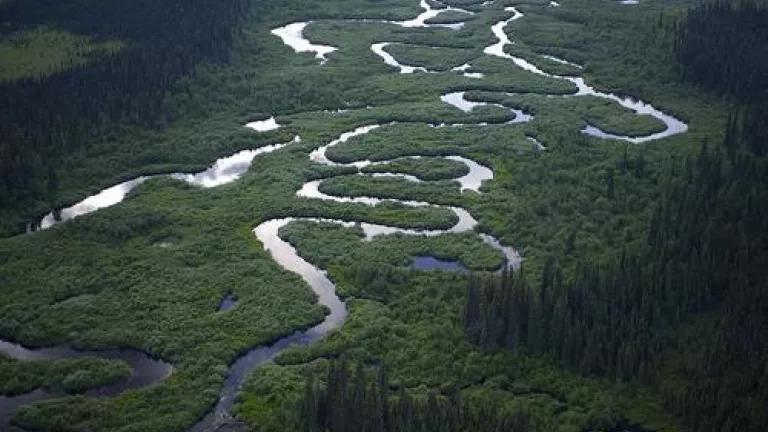
Four days after more than 10,000 people encircled the White House to protest the Keystone XL pipeline in November, the Obama administration sent the project back to the drawing board. That was a great victory, but the fight against dirty tar sands oil is not limited to the White House lawn.
More than a 130 First Nations and thousands of British Columbia residents are standing strong in opposition to yet another pipeline proposal.
A company called Enbridge wants to build the Northern Gateway pipeline to carry tar sands oil from Alberta to the coast of British Columbia. From there, it could be transported to refineries in Asia, California, or elsewhere.
Tar sands oil represents the rock bottom of our oil addiction. Enbridge and other energy companies are trying to find new veins to carry this drug—both here and in Canada—but the inescapable truth is we shouldn’t be using this dangerous substance in the first place.
On Tuesday, NRDC, the Pembina Institute, and the Living Oceans Society released a report revealing the enormous toll this project could take on communities, cultural traditions, forests, multi-million-dollar salmon fisheries, and the pristine home of the endangered Spirit Bear.
Wetland near Davie Lake, Fraser-Fort George, British Columbia
While much has been written about the devastating impacts of tar sands production, this is one of the first reports to analyze the potential harm of transporting highly corrosive tars sands bitumen at high pressure over some of the most rugged terrain on the continent.
The report documents the evidence that tar sands pipelines are more prone to spills than those for conventional crude. TransCanada’s Keystone pipeline—the same company behind the Keystone XL project—experienced 35 leaks in its first year of operation and had to be temporarily shut down by the U.S. Department of Transportation.
Enbridge—the company behind the Northern Gateway proposal—had a pipeline rupture in Michigan in 2010, sending 840,000 gallons of tar sands bitumen into the Kalamazoo River. Clean up efforts are expected to last through 2012 and cost at least $700 million.
Spills like these are devastating to local ecosystems. That’s why First Nations and environmental groups in Canada have been successfully fighting the Northern Gateway pipeline for years. NRDC joined the effort because of our longstanding commitment to protect the Spirit Bear and the Great Bear Rainforest in British Columbia.
And because transporting tar sands oil across Canadian wildlands and through its pristine bays has broader implications as well.
Tar sands oil production generates three times more greenhouse gas emission than conventional crude oil. The Northern Gateway pipeline would allow more than half a million barrels a day of this filthy to get to market and end up in our atmosphere.
North Americans are already feeling the pain of unchecked climate change in the form of flooded homes, ruined crops, and lost revenue. In 2011 alone, the United States experienced a record of 14 extreme weather events costing more than $1 billion each. Several recent reports have made a direct link between the rise in extreme weather and the rise in carbon pollution.
We don’t need to intensify climate change by burning tar sands oil. Not only is there a glut of export pipeline capacity leaving western Canada—right now current production in the region leaves 41 percent of existing export pipelines empty—but we have cleaner alternatives.
Here in the United States, President Obama proposed new fuel-efficiency standards for cars. Within 20 years, better-performing cars will save drivers more than $80 billion a year at the pump while cutting our oil use by more than we imported from Saudi Arabia and Iraq in 2010. They will also cut vehicle emissions of carbon pollution in half by 2025 compared to today.
Tar sands oil companies want us to believe we can’t go clean, but the more than 150,000 Americans who are already working to build more fuel efficient cars prove we can.
We don’t need more tar sands oil, and we don’t need more tar sands pipelines. Just because they make money for the dealer doesn’t mean they’re good for the user. You can join the NRDC members and activists who have sent more than 100,000 messages to BC Premier Christy Clark and Enbridge CEO Patrick Daniel calling for the pipeline to be cancelled.
Together, we can urge our leaders to promote clean energy solutions that benefit all of us.
Photo credit: Neil Ever Osborne
